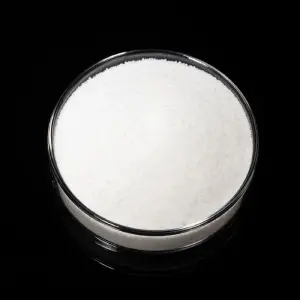
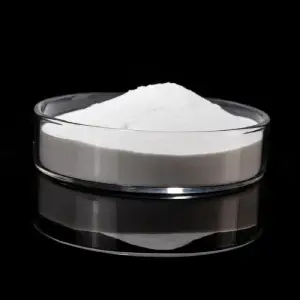
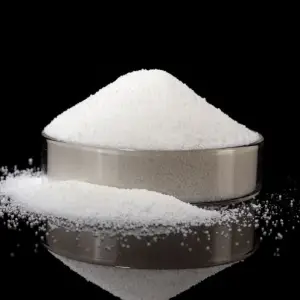
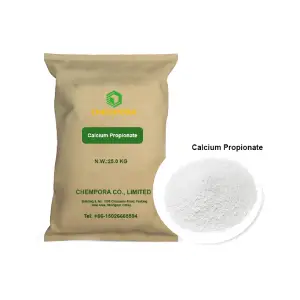
Calcium Propionate
CAS No.: 4075-81-4
Calcium propionate is a chemical compound with the molecular formula Ca(C3H5O2)2. It is the calcium salt of propionic acid and is commonly used as a food preservative and mold inhibitor.
Chempora is a leading supplier of Calcium propionate, we provide customers with high-quality Calcium propionate, if you have any requirements, please feel free to contact [email protected], we will reply you as soon as possible.
Specification Available: Food Grade
Product Introduction of Calcium Propionate
Calcium propionate is a chemical compound commonly used as a preservative in food and animal feed. It’s the calcium salt of propionic acid and is often added to baked goods like bread and cakes to prevent mold and bacterial growth, thus extending shelf life. In addition to its preservative role, it also serves as a mold inhibitor and can help in maintaining the quality of animal feed by reducing microbial contamination.
Basic Properties
Chemical Formula: Ca(C₃H₅O₂)₂
Appearance: A white to off-white powder or granules with no odor.
Molecular Weight: 186.22 g/mol.
Solubility: Soluble in water: It dissolves easily in water, forming a solution that helps it spread uniformly in food and feed products. Slightly soluble in alcohol.
Melting Point: Around 300°C (572°F), decomposes at higher temperatures.
pH: Calcium propionate typically has a neutral to slightly alkaline pH (around 7-9) when dissolved in water.
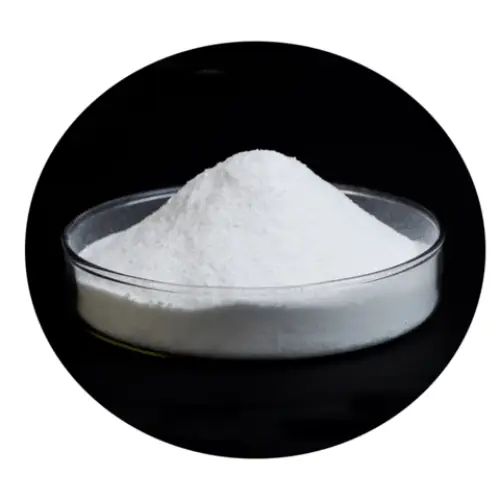
Stability: Stable under normal conditions: It is stable in dry and slightly acidic environments. However, high temperatures and prolonged exposure to moisture can cause decomposition.
Taste: Calcium propionate is generally neutral in taste and does not significantly alter the flavor of food products.
Toxicity:
Low toxicity: It is considered safe for consumption within the recommended limits set by food safety authorities (FDA, EFSA), and it does not pose significant health risks when used as a food additive.
Product Benefits of Calcium Propionate
Calcium Propionate is a preservative widely used in the food industry. It has many significant advantages, especially in extending the shelf life of food, ensuring food safety and improving production efficiency.
1. Effective preservation and inhibition of mold growth
- Preventing mold and bacteria growth: Calcium propionate can effectively inhibit the growth of mold and bacteria in food, especially in a humid environment, such as baked products such as bread and cakes. By reducing the reproduction of microorganisms, calcium propionate can extend the shelf life of food.
- Preventing mold: Especially under high humidity conditions, it can prevent baked goods and other perishable foods from mold, ensuring that the products do not deteriorate during storage and sales.
2. High safety
- Food grade standards: As a food additive, food grade calcium propionate must meet strict food safety standards to ensure that its use in food will not cause harm to the human body. It has been certified as a safe additive by international organizations such as the FDA (U.S. Food and Drug Administration) and EFSA (European Food Safety Authority).
- Low toxicity: Calcium propionate is considered to have low toxicity and will not have adverse effects on consumer health at the prescribed usage levels.
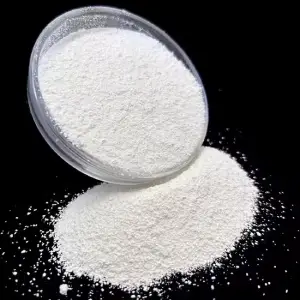
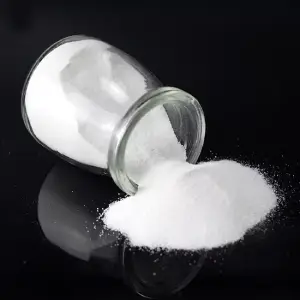
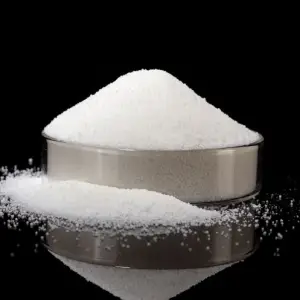
3. Extended shelf life
- Long-term preservation: Food-grade calcium propionate effectively extends the shelf life of food, especially in baked products, where it can prevent the growth of mold and keep the product fresh during long storage and transportation.
- Reduced waste: By extending the shelf life of products, food manufacturers are able to reduce losses caused by expiration or mold, and reduce production and waste costs.
4. No impact on food flavor
- No significant flavor impact: The taste and smell of calcium propionate have little effect on the taste of food, so when used in food, it will not change the flavor, texture or appearance of the food, allowing it to maintain its original sensory properties.
5. Widely applicable
- Applicable to a variety of foods: Calcium propionate can be widely used in a variety of foods, including bread, cakes, biscuits, frozen foods, dairy products, dried fruits, ready-to-eat foods, etc. It is suitable for use in a variety of processing and storage environments.
- Animal feed additives: In addition to food, calcium propionate is also commonly used in animal feed to prevent feed spoilage and maintain its nutritional content.
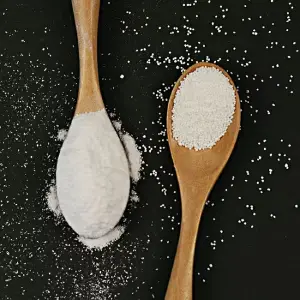


6. Cost-effective
- Economical and practical: Compared with other preservation methods, calcium propionate has a low cost and significant effect, making it very cost-effective in large-scale food production.
- Reduced refrigeration requirements: Its use can reduce dependence on refrigeration equipment and reduce storage costs for enterprises.
7. Reduced use of artificial additives
- Natural: Calcium propionate is a chemical substance of natural origin. Compared with some synthetic preservatives, it is often considered a “more natural” choice and can be used as a food preservation method without artificial additives.
8. Easy to use
- Easy to use: Calcium propionate is easy to add during the production process, does not require complex processing steps, and can be flexibly used in various food formulations.
- Strong stability: It can remain stable under a variety of processing conditions (such as high temperature and low pH), so it has a high degree of reliability in food processing.
Product Application of Calcium propionate
Calcium propionate is a commonly used food additive, mainly used as a preservative to extend the shelf life of food, especially in preventing the growth of mold and bacteria.
1. Bread and baked goods: Calcium propionate is often used in baked goods such as bread, biscuits, cakes, etc. to prevent these foods from mold or deterioration during storage, especially in humid environments.
2. Dairy products: For example, in foods such as cheese and yogurt, calcium propionate helps prevent mold growth and maintain the freshness of the product.
3. Cereal products: Such as breakfast cereals, cereal bars, etc., calcium propionate can help extend the shelf life of these dry foods.
4. Meat products: Such as sausages, ham and other cooked meat products, prevent mold during storage.
5. Feed: Calcium propionate is also widely used in animal feed to prevent moisture and mold in the feed, thereby maintaining the nutrition and quality of the feed.
6. Fruits and vegetables: In some processed fruits and vegetables, calcium propionate can be used to extend their storage time, especially dry products.
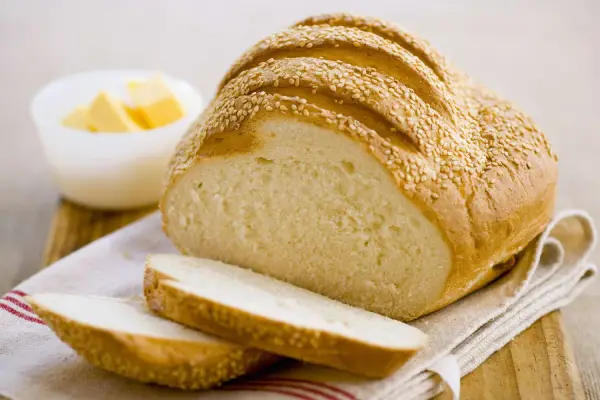





Calcium propionate is a widely used preservative in the food industry because it is relatively safe for human health and can effectively control the growth of mold and other microorganisms. However, its use needs to comply with the regulations and usage standards of food additives in various countries.
Processing Flow of Calcium propionate
The processing flow of Calcium Propionate (Ca(C₃H₅O₂)₂) involves several stages, from raw material sourcing to the final product. The general process can be outlined as follows:
1. Raw material procurement: The main raw materials are propionic acid and calcium source (such as calcium hydroxide or calcium carbonate).
2. Reaction synthesis: Propionic acid reacts with calcium source to form calcium propionate, and the reaction equation is:
2C₃H₆O₂+Ca(OH)₂ → Ca(C₃H₅O₂)₂+2H₂O
3. Separation and filtration: Remove impurities after the reaction to ensure product purity.
4. Crystallization: Obtain crystalline calcium propionate by evaporating water or other solvents.
5. Drying: Remove residual moisture, usually less than 1%.
6. Crushing and grinding: Grind calcium propionate into the required particle size as needed.
7. Quality control: Test product purity, moisture, particle size and other indicators.
8. Packaging and storage: Pack in moisture-proof containers and store in a dry, cool place for distribution.
This process ensures that calcium propionate can be used as an efficient preservative in food, feed and other fields.
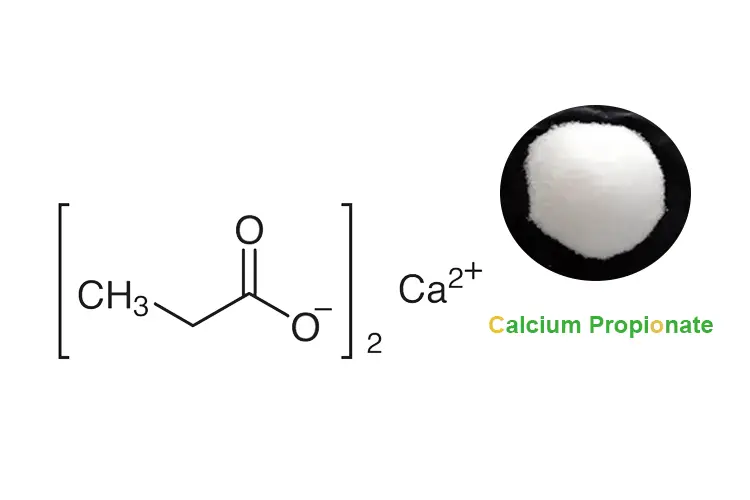
This process ensures that calcium propionate can be used as a highly effective preservative in food, feed and other fields.
Product Parameter of Calcium Propionate
| ITEMS | SPECIFICATION |
|---|---|
| Characters | White crystal, granule or crystalline powder, odorless or slightly propionic acid flavor |
| Assay (%) | 99.0-100.5 |
| Loss on drying (%) | ≤9.5 |
| Free acid (%) | ≤0.11 |
| Free alkalinity (%) | ≤0.06 |
| Heavy Metals (as Pb) (%) | ≤0.002 |
| Fluoride (%) | ≤0.003 |
| Insoluble in water (%) | ≤0.2 |
| Arsenic (As) (%) | ≤0.0002 |
| Iron (%) | ≤0.005 |
| Storage | Store in cool & dry place, keep away from strong light and heat. |
